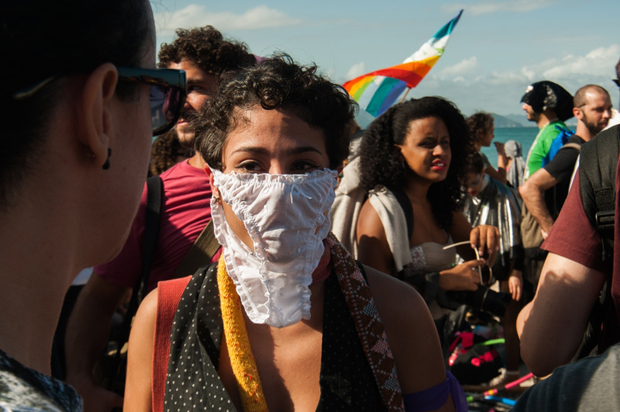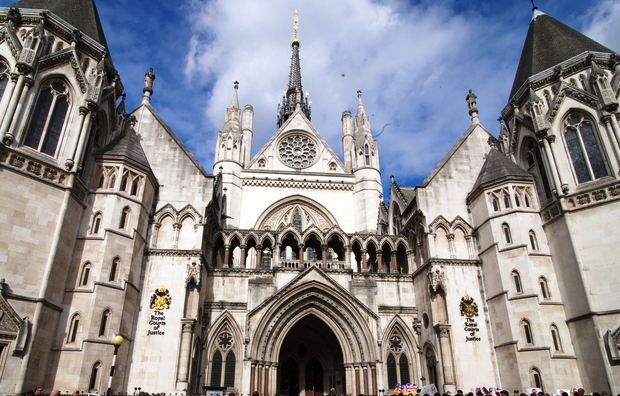2 Aug 2013 | Americas, Brazil, News, Religion and Culture

A demonstrator disguises her face during a the “March of the Sluts” in Rio de Janeiro. (Photo: Vito Di Stefano / Demotix)
“If someone is gay, and seeks God’s good will, who am I to judge?”, he told reporters on his flight back to Italy on 28 July.
“The problem is not having this orientation. We should be brothers. The problem is lobbying towards this orientation, or lobbying for jealous people, politicians, masons. This is the worst problem,” Francis said.
Frei Betto, one of Brazil’s most prominent members of Liberation Theology – a leftist religious trend created in South America in the 70’s – hopes that the Pope’s remarks about the gay community can start a new phase of dialogue.
“With Francis, the themes of sexuality could be discussed in the church with greater freedom and integrity,” he said in an interview.
However, Francis could not escape criticism from leaders of Brazil’s gay movements.
“During the debate on equal marriage law in Argentina, (Jorge Mario) Bergoglio acted as an extremist leader. He said the bill was a plot of the devil to destroy God’s plan and called for holy war”, says deputy Jean Wyllys, recalling the attitude of the pontiff back in 2010, when he was archbishop of Buenos Aires.
“Pope Francis is even worse that pastor Feliciano, because he is much more powerful, richer and smarter”, says Bahia’s Gay Group president Luiz Mott, in a reference to federal deputy and pastor Marco Feliciano, president of the Chamber of Deputies’ Human Rights Committee and famous for his homophobic remarks.
“(Francis) began his pontificate with two deeply antigay attitudes: he canonized Pope John Paul II, the biggest homophobe in the 20th century, and signed along with Pope Benedict XVI his first encyclical, which condemns gay families.”
Frei Betto concedes that most Catholics still feel cautious about more controversial issues like gay marriage, but he believes that the pope “opened an important door” to gay people.
“He took the theme out of the closet. He also supported the demonstrations, emphasizing that young people should protest, and criticized the idolatry of power and money.”
The pope spoke about the demonstrations that have broken out in Brazil’s major cities since early June. Addressing cultural and business leaders at Rio de Janeiro’s Municipal Theater, Francis said that constructive dialogue is “essential to face the present,” in a clear mention to the protests.
“Between selfish indifference and violent protest, there is an option whenever possible: dialogue. Dialogue between generations, the dialogue with the people, the ability to give and receive, remaining open to the truth,” Francis said.
Later, speaking to 3 million people on Copacabana beach, he expressly urged people to go on protests, saying that those who want to be “protagonists of change” should “overcome apathy”, though in an orderly way. “Go out the streets!”, Francis exclaimed to the crowd.
However, while the Pontiff spoke, a few hundred protesters gathered in the “March of the Sluts”, walking the boardwalk of Copacabana Beach carrying placards in favor of abortion and women’s and gays’ rights. Some women walked down the street topless, while a group smashed figures of the Virgin Mary.
“The pope supported the demonstrations, but I don’t think he learned about the March of the Sluts, which I consider disrespectful to the Christian faith, by stepping on crucifixes and such”, says Frei Betto.
Theologian Leonardo Boff, another prominent Liberation Theology figure in Brazil, says the Pope’s humbler approach led to a more understanding view of the protesters, by defending young people’s “utopia” and “the right of them to be heard”.
“The biggest legacy is the figure of Pope Francis: a humble servant of faith, deprived of all pomp, touching and letting others touch him, speaking the language of young people and (telling) the truth with sincerity”, he posted on his blog.
Francis had arrived in Brazil on 22 July where he led World Youth Journey, an international Catholic event hosted in Rio de Janeiro. Hundreds of thousands of Catholics from all over the world flocked to Rio in order to have a closer look at the Pope, who assumed a more straight-forward, simpler approach towards followers than his predecessor, Benedict XVI.
2 Aug 2013 | In the News
#DONTSPYONME
Tell Europe’s leaders to stop mass surveillance #dontspyonme
Index on Censorship launches a petition calling on European Union Heads of Government to stop the US, UK and other governments from carrying out mass surveillance. We want to use public pressure to ensure Europe’s leaders put on the record their opposition to mass surveillance. They must place this issue firmly on the agenda for the next European Council Summit in October so action can be taken to stop this attack on the basic human right of free speech and privacy.
(Index on Censorship)
Groups call for EU action against mass surveillance
Recent revelations of American and British mass surveillance of digital communications have triggered an intense mobilization of European free speech and civil liberties organizations, which have launched an online petition calling on leaders of the European Union to halt the practice.
(CPJ)
FRANCE
As France Legalizes Insulting the President, Remember the Censorship Laws That Spurred Online Free Speech Culture
As noted at Reason 24/7, France just legalized insulting the head of state, rescinding a stricture on free speech that dates to 1881 and continued to be enforced within recent years (though it was finally overruled in March by the European Court of Human Rights).
(Reason)
EGYPT
You’ve been warned! Egypt censorship body out to get “Adult Only” Ramadan dramas
To avoid issues with Egypt’s censorship board, producers of Ramadan’s televised drama series dubbed their work “Adult Only,” intended for those over the age of 18. However, Egypt’s censorship board maintains that the drama industry does not have special regulations regarding age, and as such the airing of series under an “Adult Only” label is itself a violation, censorship board head Abdel-Sattar Fathy told Al-Ahram’s Arabic website.
(Al Bawaba)
INDIA
Freedom of speech curbed amidst ‘strange’ BJP atmosphere
Congress leader Rajeev Shukla has asked people of the country to be wary of the Bharatiya Janata Party (BJP) by suggesting that the opposition party’s recent behavior is a threat to the fundamental right to freedom of speech.
(Business Standard)
Limiting access to social media can limit an individual’s freedom of speech: Facebook
In its counter-affidavit to the PIL in the Delhi high court, Facebook has argued that limiting access to social media can limit an individual’s freedom of speech and expression. The PIL, among other things, deals with the issue of minors accessing Facebook services, arguing that under the Indian Contract Act 1872, minors can’t enter into a contract. The PIL will be heard next on Friday.
(Times of India)
RUSSIA
If Snowden really wants to learn Russian…
Edward Snowden’s Russian lawyer says his clientwants to start learning Russian. Now that the American whistleblower has finally left Sheremetyevo airport for “temporary asylum” in Russia, he might find himselfiz ognya da v polymya –out of the frying pan and into the fire.
(Human Rights Watch)
RWANDA
Rwanda adopts anti-genocide law
Rwanda’s upper house on Wednesday unanimously passed a bill amending a law against “genocide ideology” that had been criticised as muzzling free speech and suppressing opposition.
(ENCA)
TUNISIA
Tunisia political quake: Protest-hit rulers struggle to save what they can
Presidency and Islamist-led government start talks with opposition and civil society representatives to try to defuse country’s political crisis.
(Middle East Online)
UNITED KINGDOM
UK govt sidles towards censorship
The UK government, under the leadership of David Cameron, is on the brink of mandating nationwide censorship, requiring Internet service providers to filter, block and report on all citizens’ browsing habits, starting with pornography. The UK will join a growing number of countries which actively censor the Internet, including most Arab states, China, and Australia.
(IT Web)
Model Rhian Sugden blasts plan to cover up sexy lads’ mags covers
MODEL Rhian Sugden has spoken out about proposals to ban “lads’ mags” from supermarket shelves. Rhian, from Radcliffe, says the country is going “censorship crazy” adding: “If you don’t like it, don’t look at it.”
(The Bolton News)
UK and China Not Such Strange Bedfellows in War on Porn
Not long after David Cameron announced the UK’s remarkable proposals to block and ban online pornography, commentators were quick to point out similarities with what has been common practice in China. One Twitter user even came up with the term “Hadrian’s Firewall,” echoing the metaphor of the “Great Firewall” so often employed in media reports about China.
(Huffington Post)
Twitter trolls drive internet free speech debate in Britain
If Twitter is the chirping chatterbox of the Internet, trolls are its dark underground denizens.
(AP via Newsday)
UNITED STATES
New Proposal Could Singlehandedly Cripple Free Speech Online
The Internet has evolved into a true marketplace for every idea – if you can think of it, you can find it on the web. That the online world has blossomed into this virtual town square teeming with diverse content is no accident. It is largely a creation of federal law – specifically, Section 230 of the Communications Decency Act of 1998. Section 230 is directly responsible for the free, messy, uncensored, and often brilliant culture of online speech.
(ACLU)
Ninth Circuit Rules That Celebrity “Rights” Trump Free Speech
Should a minor celebrity’s right to wring every drop he can from his fame trump the right to create a realistic work? The Ninth Circuit Court of Appeals put its thumb on the scales today, issuing a terrible decision holding that a celebrity’s right of publicity is more important than any First Amendment right to depict real people in a video game. This ruling follows closely on the heels of a similar decision from the Third Circuit and threatens a wide range of speech—such as biographies and documentaries—which seeks to realistically depict famous people.
(EFF)
Free Speech is Not Only About Common Good
The Supreme Court was widely criticized for ruling in Citizens United that political spending by corporations is indeed a form of protected speech under the First Amendment.
(Northwestern University)
Thanks to NSA Surveillance, Americans Are More Worried About Civil Liberties Than Terrorism
Last week’s narrow House vote against the Amash Amendment, which was aimed at stopping the National Security Agency’s mass collection of Americans’ phone records, reflects a narrow split among the general public.
(Reason)
Google Pressure Cookers and Backpacks, Get a Visit from the Feds
Michele Catalano was looking for information online about pressure cookers. Her husband, in the same time frame, was Googling backpacks. Wednesday morning, six men from a joint terrorism task force showed up at their house to see if they were terrorists. Which prompts the question: How’d the government know what they were Googling?
(The Atlantic)
UMass Chancellor: Campus Leaders Must Encourage Debate, Not Censorship
Far too often, college administrators fail to recognize the value of free speech in education and instead take action to censor students’ protected expression. However, Kumble Subbaswamy, Chancellor at University of Massachusetts, Amherst, commendably advocated for free speech in a recent article for The Huffington Post.
(FIRE)
Training Camp Day 8: Free speech is not free
Just dropped my alto saxophone player off at band camp and was listening to guys on Sirius XM NFL radio.
They were talking about Philadelphia Eagles wide receiver Riley Cooper getting fined for making a racial slur at the Kenny Chesney concert.
(Atlanta Journal Constitution)
VIETNAM
GOVERNMENT WANTS TO BAN INTERNET USERS FROM DISCUSSING THE NEWS
Reporters Without Borders regards a new law on blogs and social networks – announced on July 31st and due to take effect in september – as a gross violation of the right to inform and be informed. Known as Decree 72, the law restricts the use of blogs and social networks to “providing or exchanging personal information” and bans using them to share information from news sources.
(RSF)
Previous Free Expression in the News posts
Aug 1 | July 31 | July 30 | July 29 | July 26 | July 25 | July 24 | July 23 | July 22 | July 19 | July 18 | July 17 | July 16 | July 15 | July 12
1 Aug 2013 | News, Politics and Society, Religion and Culture, United Kingdom

The Royal Courts of Justice, London (Image Graham Mitchell/Demotix)
A recent libel judgment has raised an interesting question: should you be able to sue for a bad review?
I should probably give a little background. This all dates back to a case involving an Amazon thread row between two men, Christopher McGrath and Vaughan Jones. In fact, I’m going to use the exact summary from last week’s judgment by Mrs Justice Davies, lest I be accused of twisting a story that’s a little complicated. Here we go (note – her punctuation, not mine):
[I]n 2010, the claimant [Christopher McGrath] published under the pseudonym “Scrooby” a book entitled “The Attempted Murder of God: Hidden Science You Really Need To Know”. In the same year, Professor Stephen Hawking and Leonard Mlodinov published a book called “Grand Design: New Answers to the Ultimate Questions in Life”. The book was offered for sale on Amazon, the page on which it was advertised included a facility for users to post reviews. The claimant, as Scrooby, posted a review of the Hawking book, the review is described by the defendant [Vaughan Jones] as “more or less a naked puff of the claimants own book”. The claimant’s review attracted many critical comments. An online argument ensued with a number of contributors including several who were in fact, the claimant using other aliases. One contributor was Vaughan Mr Vaughan Jones. It was he who outed the claimant as Scrooby, questioned the claimant’s marketing tactics, belittled the claimant’s book and publishing business and took issue with the claimant both as to his views and conduct. The war of words spilled over onto the website of the Richard Dawkins Foundation when Mr Vaughan Jones began a discussion on the site complaining that the claimant had threatened to sue him for libel comments made in the Amazon thread.
The claimant issued proceedings in the Dawkins Action on 1 April 2011. The Dawkins defendants subsequently applied to strike out the claim upon a number of bases, all of the defendants applies for rulings on meaning. The claim against Amazon was struck out in its entirety. The claims against Richard Dawkins and Mr Vaughan Jones were struck out as the only actionable aspects of the claims against them, which had survived the abuse of process and meaning applications, were disposed by way of undertakings.”
Jerome Taylor, than of the Independent (now at AFP) reported on the case, and included a quote from Index’s Mike Harris, speaking in his role as part of the Libel Reform Campaign.
McGrath took objection to the article, which he said implied that he had sued merely for bad reviews. So he proceeded to sue the Independent for suggesting that he would sue someone for a review (keep up). According to the judgment, he pleaded*:
A book review is a subjective response and is widely regarded as a matter of opinion, a legally framed objection to which clearly falls into the realm of stifling free speech, which is of course a Human Right protected in international law. Such a claim demonstrably engenders a lowering of opinion of a litigant by ordinary readers and is therefore defamatory.”
So McGrath is, interestingly, claiming that to suggest someone would impinge on free speech by suing for libel is defamatory.
Mrs Justice Davies, however, in her judgment in McGrath v Independent, disagrees:
[…] I accept that there may be certain members of society who view with disfavour or scorn an author suing over a book review, but I do not accept society in general would hold that view. Nor do I accept the claimant’s assertion that suing over a book review is contrary to “established norms of free speech” which would “rightly attract opprobrium in a democratic society.
…
Further, the claimant’s contention that the institution of libel proceedings in respect of a book review would, of itself, bring upon him ridicule and opprobrium ignored the fact that all libel proceedings impact upon freedom of speech enshrined in Article 10. [my emphasis]. It cannot be defamatory to identify one set of libel proceedings which would attract opprobrium on the grounds of running counter to the norms of free speech when the very fact of any libel proceedings impact upon such a right.”
Which seems reasonable.
I can only think of two recent libel cases involving reviews: Thornton v Telegraph and Goodfellas’ v Irish News.
The former hinged on a mistake made by the Telegraph’s critic Lynn Barber, who, in a review branded as “spiteful” by Mr Justice Tugendhat, claimed that Sarah Thornton, author of Seven Days in the Art World, claimed that the author had falsely suggested she had interviewed Barber, a keen contemporary art collector. It turned out Thornton had, and Barber had forgot when she wrote the review.
In Goodfella’s v Irish News, Caroline Workman submitted a scathing view of a Belfast Italian restaurant, and was successfully sued by the owners in 2007. Workman won on appeal (represented by Lord Lester of Herne Hill) and briefly became a cause celebre among restaurant critics – The Times’s Giles Coren, who normally resents leaving North London, travelled all the way to Northern Ireland to review Goodfella’s in solidarity (£).
A good principle. But I do have a certain amount of sympathy with McGrath’s argument, or at least I understand it: reviews pages are supposed to be places where vigorous and rigorous debate takes place – where are allowed to perform a true, gleeful hatchet job. There’s even a prize to encourage critics to stick the boot in (read last year’s glorious winner – Camilla Long’s review of Rachel Kusk’s Aftermath, at the Hatchet Job of the Year website). And there is at least a perception that people of letters should not resort to the courts because someone was mean about their latest work in the Spectator. They should just bitch about each other at book launches and send in gossipy titbits to Private Eye.
The to-be-enacted Defamation Act 2013 is supposed to allow for greater leeway in public interest journalism. Does a devastating review count?
*This article was amended on 2 August to clarify the source of a quote, and add the word “to” in the phrase “a legally framed objection to which”
1 Aug 2013 | News, Pacific Standard, Russia

Russian lawmaker Vitaly Milonov has suggested that every gay athlete and spectator who comes to Russia for the 2014 Games will be arrested. (The International Olympic Committee says that won’t happen.) And while it is not totally clear what the “gay propaganda” law specifically means, Global Post has a useful summary:
Reports of arrest for kissing or hold hands, wearing or using rainbows, or pro-gay activism have helped to clarify the definition of “propaganda” as “any statement, oral or otherwise, that is pro-gay.”
It is now illegal to even admit homosexuality in public. It is also illegal to equate the value of homosexual relationships with that of heterosexual relationships, and punishment does not apply solely to Russians.
Foreigners can be arrested and detained for up to 15 days, fined and deported.
So, basically, anything remotely gay, and you’re in prison. With that in mind, I suggest, to Milonov and the rest of Russia, that every sport be banned from the 2014 Winter Games.
Alpine skiing? The competitors wear rainbow-colored spandex, which is often associated with “gay” in popular culture.
Biathlon? Men. Holding guns. Discharging them into the air. Textbook phallic symbolism.
Bobsled? Four men in spandex, stuffed inside a penis-shaped capsule. You could also argue that women doing the same—being inside of the penis capsule, which is an anti-traditional-sex position—is just as evocative of disruption.
Cross-country skiing? See alpine skiing.
Curling? Women eschew traditional feminine attire for pants and polo shirts. Men crash large stones into large stones strategically placed by other men.
Figure skating? “I can say that the best figure-skating in the world is the Soviet school of figure skating,” said Milonov. I have no response.
Freestyle skiing? Women with sticks strapped to their feet stomp over moguls, which evoke breasts, and thus suggests a rejection of classical femininity.
Ice hockey? Wood-en sticks are used to slap a hard and cold object past a desexualized being covered in padding and shielded by a mask.
Luge? Men in spandex, laying backwards, in direct contrast with the traditional male posture of dominance. Women, erect and sliding through a giant tube, subverting the basic male-to-female sex act.
Nordic combined? One gay sport plus another gay sport equals a really gay sport.
Short track speed skating? Often results in members of the same sex piled on top of each other while wearing extremely tight clothing, and is therefore not too dissimilar from a public orgy.
Skeleton? The name itself is a rejection of the appearance and the living human characteristics which are the basis of traditional patriarchal society. That, therefore, is an inherently gay attitude.
Ski jumping? Both male and female posit themselves as human phallic symbols, hurtling through the air. That evocation of equality is gay.
Snowboarding? The sport was founded as a counter-cultural activity, which is gay.
Speed skating? Hooded spandex outfits obscure any suggestion of gender across all competitions, thus creating a space for any/all close readings of sexuality, which would not be the case in a climate where “gay” is considered illegal.
In short, ban the 2014 Winter Olympics from Russia.
This article originally appeared at Pacific Standard. Pacific Standard is an arm of the nonprofit Miller-McCune Center for Research, Media and Public Policy.




